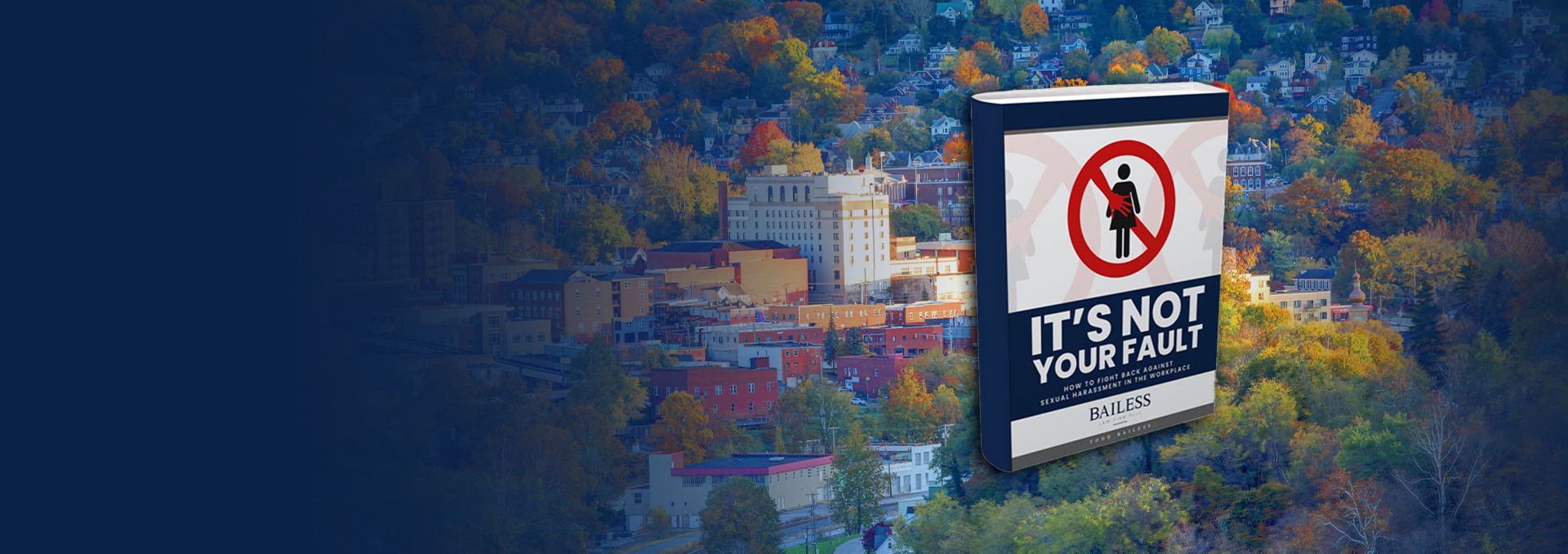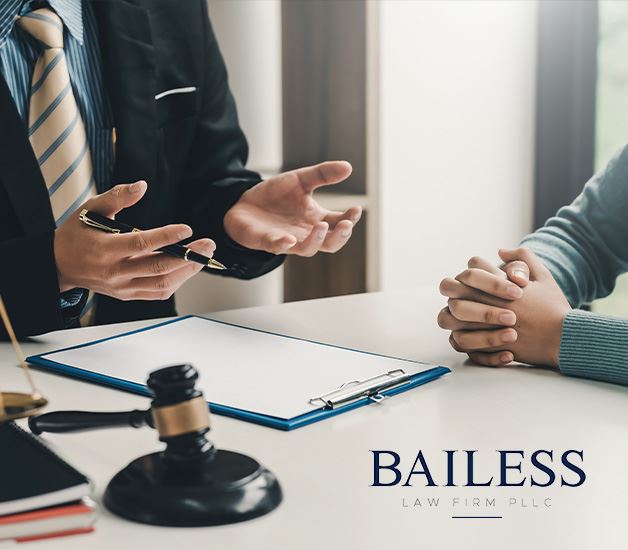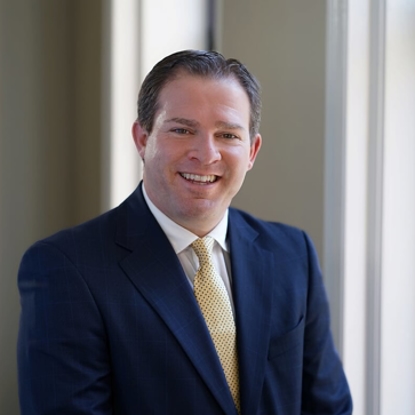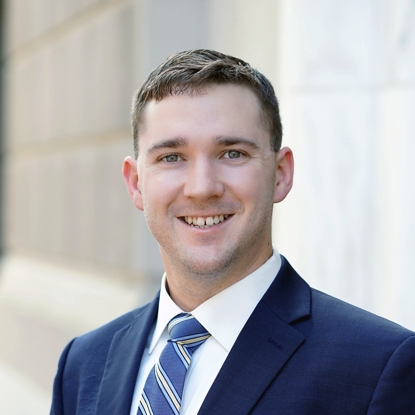
Employment Lawyers in Charleston, West Virginia
Also Serving all of West Virginia, Morgantown, Clarksburg and Parkersburg
With Bailess Law Firm, you can expect unmatched representation. We pride ourselves on our dedication to our clients. A trusted name in West Virginia employment law, Bailess Law Firm focuses on cases involving workplace sexual harassment or retaliation. If you've been sexually harassed by an employer or were targeted for reporting unsafe conditions or unlawful treatment, we can help you fight for the accountability and compensation you deserve.
Skilled Legal Counsel & Compassionate Support for Employees Facing Sexual Harassment or Retaliation in West Virginia
You work hard to make ends meet, and you have a right to do it in an environment that's safe and free from harassment, retaliation, and other types of mistreatment or abuse. Unfortunately, not all employers are committed to making the workplace safe for their employees.
If you were sexually harassed on the job or became a target of retaliation after reporting harassment or unsafe working conditions, it's easy to feel like you're stuck between a rock and a hard place with no good options. You could stay in the job and continue to endure a hostile or degrading work environment or speak up and risk losing your income.
Whether you've already been forced out of your job or are still there debating what to do next, one thing is certain: You need a skilled employment attorney. Thankfully, you've come to the right firm.

Hear Hear Why Our Clients Trust Us
Reviews & Testimonials
-
“All around great company!”- Alexis W.
-
“I highly recommend you turn to the Bailess Law Firm for honest and straight forward help with your legal issues.”- David M.
-
“If you are looking for a law firm that will be dedicated to you and your case, then Bailess Law Firm is the best around.”- Wanda W.
-
“They were so very helpful”- Jessica M.
-
“Joanna Browning is the best paralegal”- Britiany L.
-
“Todd Bailess has been a pleasure to work with, he is always responsive, and very detail oriented!”- Nia A.
-
“I’ve never talked to a law firm that made me feel like they really cared”- Brayson V.
-
“They work hard to take excellent care of their clients.”- Christopher T.
Honest, Understanding, & Experienced
At Bailess Law Firm, we understand how frightening and unsettling it can be to suddenly find yourself without a job or a source of income — and we're here to help. Forget everything you've heard about "at-will" employment; there are exceptions to protect you from an employer's unlawful behavior.
Talk to us about your case. We'll listen without judgment, explain your legal rights and potential options for compensation, and work to build a strong case for damages.
Call (304) 841-0037 or contact us online to discuss your case with an employment lawyer in Charleston, WV.


Working in a toxic environment polluted with sexual harassment, discrimination & retaliation?

Our Results
Recent Case Victories
Our top priority is to devise customized legal strategies that are tailored to the unique legal needs of our clients, no matter how simple or complicated their situations, might be.
-
Bailess Law Firm Restores the Dignity of Longtime Charleston, West Virginia Employee in Disability Discrimination Case
At the outset, we met and talked to the worker, and thoroughly explained the legal process of a disability discrimination case. From there, we worked with him to gather all the pertinent documentation ...
-
5 Million Recovered over $5 million for thousands of West Virginia workers.
Our experienced attorney recovered over $5 Million for thousands of West Virginia workers that had their wages withheld.
-
Bailess Law Firm Brings Hope to Expectant Mom in Pregnancy Discrimination Case Against National Hotel Chain
We helped her gather all of the pertinent documentation and evidence that proved her employer discriminated against her because of her pregnancy. Through the expectant mom’s perseverance to hold the ...
-
National Cookie Chain Failed to Protect Its Female Employees
Through the combined efforts of our legal team and our clients’ steadfast resolve, we were able to hold the company accountable, forcing them to reevaluate and enforce their sexual harassment policies ...
-
1 Million Relentless Sexual Harassment by a Supervisor
We represented female employees who endured relentless sexual harassment in the workplace by their supervisor.
-
1.5 Million Recovered over $1.5 million in a workplace sexual harassment case.
Our experienced employment law attorneys recovered over $1.5 million in a workplace sexual harassment case.
-
Bailess Law Firm Restores Dignity of Single Mother After Sexual Harassment at WV Oil & Gas Company
Through the combined efforts of our legal team and our client’s unwavering determination, we were able to hold the company accountable and obtain a life changing result for the single mother.
-
WV Coal Company Held Accountable For Wrongful Termination
In the end, we were able to obtain an excellent result for our client. Although our client should have never lost his job in the first place, we are so appreciative to take part in helping him restore ...
Our FAQ
Frequently Asked Questions
Have questions? We are here to help. Still have questions or can't find the answer you need? Give us a call at 304-841-0037 today!
-
How will I know if my employer is retaliating against me?
Being treated differently at work or threatened with termination after reporting harassment, discrimination, or safety issues? Retaliation may be to blame. While retaliating against workers is expressly prohibited, sadly, it isn't uncommon. According to the U.S. Equal Employment Opportunity Commission (EEOC), retaliation is involved in more than half of the roughly 70,000 complaints the agency receives each year.
Retaliation comes in many different forms in the workplace—and while some types may be glaringly obvious, the more subtle varieties are just as common and potentially even more dangerous. Here's what you should know about West Virginia employment retaliation cases, including how to recognize retaliatory actions and how our exceptional team of attorneys can help you hold your employer accountable.
Workplace Retaliation Is Against the Law
Federal EEOC laws, as well as the West Virginia Human Rights Act, prohibit employers from retaliating against workers for engaging in protected acts, such as:
- Rejecting unwanted sexual advances
- Reporting sexual harassment
- Reporting unsafe working conditions
- Requesting accommodations for disability or pregnancy
- Reporting patient abuse
- Applying for workers' compensation benefits
- Reporting understaffing at a hospital or other medical facility
- And others
Recognizing On-the-Job Retaliation
While overt acts of retaliation—such as swiftly terminating an employee who had just reported harassment or discrimination—can and do happen, it's a lot more common for employers to engage in the type of subtle behavior that leaves you second-guessing yourself. Examples of workplace retaliation include:
- Demotions
- Assigning you less desirable shifts
- Scheduling you to work with your harasser
- Reduced hours
- Pay cuts
- Subjecting you to increased scrutiny
- Write-ups
- Suspensions
- Layoffs
- Denying you training or advancement opportunities
- Giving you poor performance reviews that are undeserved
- Excluding you from meetings, office functions, activities made available to other employees
- Making your job or position more difficult
- Failing to take prompt corrective action after a report of harassment or discrimination
These are just a few of the many actions that may be considered retaliatory. Not sure if the treatment you're experiencing qualifies? Our experienced employment attorneys can help.
What to Do If You're Facing Retaliation at Work
Working in an environment that's safe and free from harassment, discrimination, and retaliation is your legal right. Don't suffer in silence. If you're being harassed, discriminated or retaliated against, or subjected to a toxic working environment, report it.
- Facing retaliation from a fellow employee? Tell a supervisor or company owner, or report it to the human resources department.
- Facing retaliation from a supervisor or business owner? Report it to a different supervisor or company owner, the human resources department, or a company complaint hotline.
We Can Help You Hold Your Employer Accountable
Your employer is responsible for ensuring a safe workplace that's free of unlawful harassment, discrimination, and retaliation. Whether they're the source of the retaliation, or you're being retaliated against by someone else at your company, the highly skilled legal team with Bailess Law Firm can help you hold your employer accountable and recover the damages you deserve. Depending on the facts and evidence in your case, you may be able to collect damages for lost wages and benefits, emotional distress, and other losses. In rarer instances, judges and juries may award an additional kind of damages—known as punitive damages—to punish employers for particularly egregious conduct.
Talk to Us About Your West Virginia Employment Retaliation Case
Federal and West Virginia employment law is complex and complicated, and holding an employer accountable for unlawful conduct can be challenging. You need compassionate, caring, and capable attorneys to level the playing field and fight tirelessly on your behalf. Fortunately, you've come to the place. Download our book It's Not Your Fault: How to Fight Back Against Sexual Harassment in the Workplace and contact Bailess Law Firm today for a free initial review of your Mountain State employment retaliation claim.
-
How can an attorney help if I'm dealing with sexual harassment at work?
Facing a barrage of unwanted sexual advances; requests for sexual favors; and sexually suggestive jokes, comments, and innuendos can be harmful and degrading no matter where it happens. Unfortunately, sexual harassment that occurs at work is particularly insidious because it relies on an imbalanced power dynamic and the fear that you could lose your job or income to make you feel trapped and hopeless.
Here's what your harasser doesn't want you to know: You don't have to put up with sexual harassment in the workplace. A skilled employment attorney can help you take action to hold your employer accountable.
At Bailess Law Firm, we know how difficult it can be to come forward with such personal experiences. Our compassionate and understanding employment lawyers are here to make the process as easy as possible. Here's how we can assist you.
Help You Understand Your Legal Rights and Options
Harassers work hard to make you feel like you don't have any power. However, both state and federal laws protect workers from being sexually harassed on the job. You have the right to work in an environment that's safe and free from unlawful harassment or discrimination. If you were targeted for sexual harassment at work or were subjected to a hostile work environment, we can help you understand your legal rights and options for seeking damages.
Gather Important Evidence
Gathering evidence to support your claim is essential but, for some sexual harassment survivors, doing so can be difficult, time consuming, or even traumatic. We are here to help. In addition to gathering evidence like texts or emails, we can also get statements from others who witnessed or were affected by the harassment, and interview experts to assess the scope of the damages you suffered.
Level the Playing Field
A workplace sexual harassment claim can pit you against an employer's high-powered corporate legal team. Having an experienced employment attorney to represent you throughout litigation levels the playing field, and sends the message that you're serious about your case and receiving fair damages for it.
Prove Your Claim and Help You Recover Damages
Recovering damages for employment sexual harassment requires proving that the conduct in question was unlawful. Unwelcome sexual advances, requests for sexual favors, and other verbal or physical conduct of a sexual nature may be considered harassment when:
- Submission is explicitly or implicitly made a condition of your employment
- Submission or rejection is used as the basis for employment decisions
- Conduct has the purpose or effect of unreasonably interfering with work performance, or creating a hostile, intimidating, or offensive work environment
While what you recover is highly dependent on the facts and evidence in your case, potential damages include lost wages and benefits, related medical costs, and emotional distress damages.
Believe, Support, and Encourage You Throughout the Legal Process
When you're taking legal action to hold an employer accountable for sexual harassment, you need employment attorneys who can serve dual roles as fierce legal advocates, and kind and conscientious counselors. Bailess Law Firm does exactly that. We're here to provide a safe space for you to share your experiences and get the legal services—as well as the protection, guidance, encouragement, validation, and support—you need. However, while you see our softer side, we're known for diligently fighting for our clients at the negotiations table and in the courtroom. We are here for you when you need us, every single step of the way.
Talk to Us About Your Case
Contact Bailess Law Firm today to schedule an appointment for a complimentary review of your West Virginia workplace sexual harassment case. We'll work to determine if your case and our firm are a good fit, but don't worry about the fee. If we accept your case, you pay nothing, ever. That's our guarantee.
-
Can I be fired for taking time off from work because of an injury or illness?
Unfortunately, it's possible. West Virginia law does not require employers to provide employees with sick leave benefits of any kind. Because of at-will employment laws, employers in the Mountain State can fire workers at any time, for any reason—or even no reason at all.
However, there are some exceptions. For example, the firing can't be done in retaliation for an employee engaging in a protected activity—such as reporting sexual harassment, hostile work environment, or safety issues—or violate other anti-discrimination laws. Also, when employers choose to provide workers with sick leave benefits, they're required to abide by the terms established in the company policy or employment contract. In some cases, the Federal Family and Medical Leave Act (FMLA) may provide some protection.
Were you fired for taking time off when you were injured or ill? Depending on the circumstances, you may be entitled to damages. Here's what you should know about West Virginia workplace retaliation cases, including how the exceptional employment attorneys at Bailess Law Firm can help you understand your rights and explore your options for taking legal action.
Recognizing Retaliation: When it Isn't Really About Sick Leave
While an employer may be able to fire you for calling out sick if you don't have any kind of sick leave benefits, there are times when that kind of harsh employment decision is motivated by more than just an unexcused absence. Consider the timing. Did your termination for an injury or illness-related work absence happen after you:
- Reported sexual harassment or a hostile work environment
- Reported other types of illegal employment discrimination
- Reported unsafe practices or safety violations
- Participated in an investigation of workplace sexual harassment, safety violations, or other unlawful discrimination
- Filed a claim alleging discrimination?
If so, you should also examine the way you were treated before being fired. Were you:
- Demoted
- Transferred to a less desirable position, schedule, or location
- Scheduled to work with someone you reported for sexual harassment or discrimination
- Denied a promotion or pay raise
- Subjected to verbal or physical abuse
- Targeted for increased scrutiny
- Given an unfairly negative performance review
What you experienced might be workplace retaliation. Talking to a seasoned employment attorney is the best way to determine if you have grounds to move forward with a claim or lawsuit.
A Quick Word About the Federal Family and Medical Leave Act (FMLA)
You may have heard that the FMLA allows workers to take unpaid leave for medical or family reasons without losing their jobs. However, the truth is a lot more complicated. The FMLA only applies to private-sector employers that employ 50 or more people—and to be protected by the law, you must have worked for your employer for at least a year and for a minimum number of hours. The law also specifies the situations in which FMLA leave can be used. Talk to one of our attorneys to find out whether this law applies to your case.
What You Could Recover and What You Have to Prove in a West Virginia Employment Retaliation Case
Potential damages in an employment retaliation case are wide-ranging and may include lost pay and emotional distress. In order to secure fair damages, you and your attorney will have to prove that:
- You experienced (or witnessed) illegal harassment or discrimination
- You engaged in a protected activity (such as reporting harassment)
- Your employer responded with a negative employment action (firing you)
- You suffered damages as a result
Ready to find out how the caring and capable legal team with Bailess Law Firm can help you hold your employer accountable for retaliation?
Schedule a Complimentary Case Review
Contact us today to request a free, no-obligation review of your case.
-
What do I need to know if I’m facing sexual harassment at work?
Sexual harassment is widespread in workplaces throughout the United States. While sexual harassment exists in all industries, it is most prevalent in the restaurant industry. 71% of women who worked in a restaurant have been sexually harassed on at least one occasion. Moreover, 98% of all women in the survey reported at least one incident of retaliation following their report of sexual harassment, according to a report published by One Fair Wage in March 2021.
If you are facing sexual harassment, you are not alone. Here are seven key points you should know:
#1 – You Have a Right to a Workplace Free of Sexual Harassment.
Sexual harassment is never something that is “part of the job.” It is illegal under West Virginia and federal law to sexually harass employees in the workplace. The West Virginia Human Rights Act (“WVHRA”) and Title VII of the Civil Rights Act of 1964 protect you from unwanted sexual harassment in the workplace. To fall under these Acts, your employer must have a certain number of employees. The WVHRA requires twelve or more employees in West Virginia for twenty or more calendar weeks in the year the sexual harassment occurred, while Title VII requires 15 or more employees. In the event your employer does not reach these thresholds for employees, the substantial public policy of West Virginia may provide you protection.
#2 – Types of Sexual Harassment.
There are two types of sexual harassment:
- Quid pro quo
- Sexual harassment hostile work environment
Quid pro quo is a Latin phrase that means “this for that.” This type of sexual harassment occurs when a supervisor or employee conditions an employee’s hiring, pay, benefits, or continued employment on the employee’s consent to participate in sexual acts. A classic example of quid pro quo sexual harassment is when a supervisor promises a promotion or favorable job conditions in exchange for sex. On the other hand, sexual harassment hostile work environment occurs in various forms such as unwanted sexual advances, touching, inappropriate jokes, intimidation, retaliation, or an employer failing to take prompt action after a report of sexual harassment.
#3 – Sexual Harassment Is More Than Inappropriate Touching.
Inappropriate touching is a common form of sexual harassment. The West Virginia Code of State Rules broadly defines sexual harassment as unwelcome sexual advances, requests for sexual favors, and other verbal or physical conduct of a sexual nature intended to interfere with an individual’s work performance or create an intimidating, hostile, or offensive work environment. As you can see, sexual harassment encompasses so much more than just touching. Sexual harassment includes unwanted sexual advances, inappropriate jokes, sending offensive text messages, displaying pornography, violating personal space, “testing the waters” for sex, or asking about your private sex life. Sexual harassment can also exist when you are subjected to an intimidating work environment because you are female.
#4 – The Harassment Does Not Have to Be Directed at You.
A sexually hostile work environment is not confined to the target of sexual harassment. Indirectly witnessing sexual harassment or experiencing a workplace culture that tolerates sexual harassment can be just as devastating as directly experiencing the harassment. This is commonly referred to as “ambient” sexual harassment or “secondhand smoke.” The WVHRA and Title VII provide protection for indirect sexual harassment.
#5 – Psychological Effects of Sexual Harassment.
The emotional and psychological effects of sexual harassment can have lasting consequences. Survivors of sexual harassment can experience nightmares, anxiety, depression, loss of self-esteem, withdrawal, horror, fear, helplessness, and avoidance. Many survivors of sexual harassment develop post-traumatic stress disorder (“PTSD”). The Diagnostic and Statistical Manual of Mental Disorders [DSM-V] associates PTSD with experiencing a traumatic event like sexual harassment. There are damages available under the WVHRA and Title VII for emotional distress related to sexual harassment. At Bailess Law Firm, we believe the psychological and emotional effects of sexual harassment may be the greatest damages our clients experience.
#6 – Report Sexual Harassment Immediately.
Reporting sexual harassment triggers the employer’s duty to act. If a co-worker or customer is sexually harassing you, you should immediately report the harassment to a supervisor or human resources. On the other hand, if your supervisor or an owner is the source of the harassment, you can report the sexual harassment to another supervisor, owner, or human resources. Alternatively, some companies have a hotline you can call to report the harassment. When a supervisor engages in sexual harassment, his or her conduct can automatically make the employer liable. Under the WVHRA, an employer is responsible for the acts of its supervisors performed in the scope of their employment. Supervisors can also be found liable under the WVHRA for failing to take prompt and corrective action against co-workers who knowingly engage in sexual harassment.
#7 – Damages Available for Sexual Harassment
Employers who violate sexual harassment laws may be on the hook for your lost wages, emotional distress damages, and punitive damages pursuant to the WVHRA. Keep in mind, punitive damages are designed to punish and deter your employer from engaging in future acts of sexual harassment. Additionally, your employer may also have to pay for the time and costs your attorney incurs in the case.
Our team at Bailess Law Firm has proudly represented many survivors of sexual harassment. We recognize firsthand the courage it takes to come forward about sexual harassment. Our team is committed to preventing sexual harassment in the workplace. We will listen to you without judgment in a pressure-free environment. Whether you would like more information, want to take action against your employer, or just want to talk, please contact us for a free consultation at 304-841-0037or complete our contact form and download our book It's Not Your Fault: How to Fight Back Against Sexual Harassment in the Workplace for more information.


Why Choose Bailess Law Firm PLLC?
What Makes Us Different
-
Experienced and dedicated representation
We put our extensive knowledge and skills to work for you, and we are committed to doing what is best for your case. That means we will never settle for less just to avoid going to trial.
-
Compassionate client support
We know you've been through a lot, so we work diligently to make this difficult time as painless as possible, providing encouragement, guidance, validation, and support throughout the litigation process.
-
Honesty & Integrity
When someone in a position of power has wronged you, it can be hard to know who to trust. We hold ourselves to the highest ethical standards so you can feel confident in our counsel.
-
Discretion & Confidentiality
We value your confidentiality and the sensitive nature of being sexually harassed or retaliated against in the workplace. Conversations between attorneys and clients are protected, and your privacy is important to us.
-
Sensitivity & Understanding.If you’ve been sexually harassed at work, you may not feel comfortable discussing your experience with a male attorney. We’re mindful of your concerns and we have a team who can assist you comprised of a female attorney and paralegals.





















